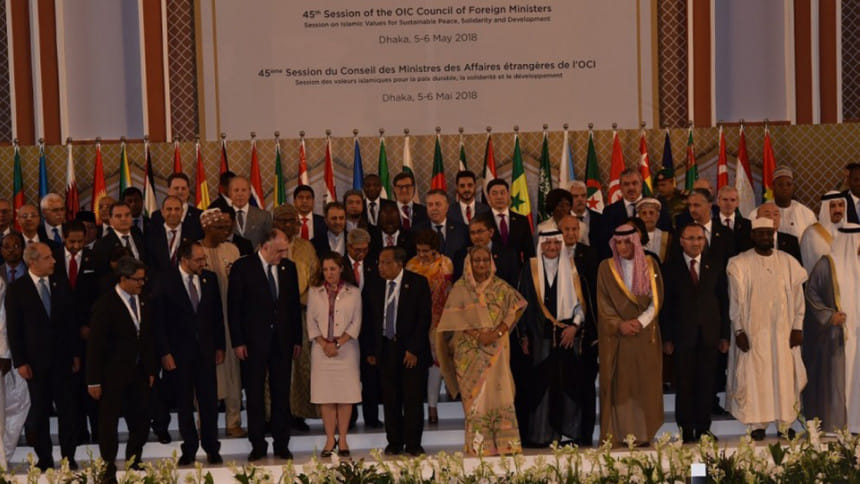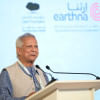Blatant violation of int'l law

The Organisation of the Islamic Cooperation member states have sought strong international support to resolve the Rohingya crisis and full implementation of the Kofi Annan led advisory commission recommendations in Myanmar's Rakhine State.
“We express deep concern over the recent systematic brutal acts perpetrated by security forces against the Rohingya Muslim community in Myanmar that has reached the level of ethnic cleansing, which constitute a serious and blatant violation of international law,” the OIC's Dhaka Declaration reads.
The 45th OIC Council of Foreign Ministers (CFM) adopted the 39-point declaration before concluding the two-day event yesterday at Bangabandhu International Conference Centre (BICC).
The declaration underlined the importance of the OIC member states continuing to engage in the UN system, especially the UN General Assembly and Human Rights Council as well as other relevant international organisations, to address the human rights violations in Rakhine State.
The CFM also adopted a resolution regarding the situation of Rohingyas in Myanmar and agreed to form a ministerial-level ad-hoc committee to address the crisis.
The declaration reaffirmed its support for the Palestinian people to regain their right to self-determination, and to the independence and sovereignty of the State of Palestine on the pre-1967 borders with Al-Quds Al-Sharif as its capital.
It also declared support for the right of the Palestinian refugees to return to their homes in accordance with international law and UNGA Resolution 194(III).
The OIC CFM then rejected the United States' recent recognition of Jerusalem as the capital of Israel and termed the decision to move its embassy to the city on May 14 illegal.
The Dhaka Declaration called for immediate release of all Palestinian prisoners and detainees in Israeli prisons and detention centres.
Addressing a joint press conference, Bangladesh Foreign Minister AH Mahmood Ali said the delegates pledged complete solidarity with “Bangladesh in the face of the huge Rohingya influx with its humanitarian and security consequences for the country and with the Rohingyas, victims of state backed violence in Myanmar.”
He also thanked the OIC member states for their humanitarian aid to the Rohingya camps and called for more assistance to help Bangladesh cope with the situation.
The minister added that with almost 600 delegates, the OIC meet was one of the largest in history.
OIC Secretary General Yousef A Othaimeen told the joint press conference that the ad-hoc committee would mobilise international support and ensure accountability for the human rights violation against the Rohingyas.
“This is important not only for Muslims but also for the world because this is not a religious conflict, this is a humanitarian, human rights issue. This is something everybody on the planet must be concerned about,” he said.
The 45th CFM adopted more than 120 resolutions on issues regarding political, economic, social and cultural aspects of OIC member states.
Four of those resolutions, put forward by Bangladesh, are about regional integration through enhanced connectivity, cooperation in the media for sharing best practices on SDG implementation, comprehensive OIC reforms (jointly with Turkey) and establishing a special chair at Dhaka University.
State Minister for Foreign Affairs Shahriar Alam said there were countries where Muslims were not the majority. But the number of Muslims in those countries was more than the size of entire populations of many OIC member states. The Muslims in those countries should not be deprived of the OIC benefits.
“OIC means an organisation of Islamic cooperation, not countries,” he said.
Bangladesh proposed a reform to the OIC that would enable all Muslims across the world to benefit from the OIC. Only Muslim-majority countries are OIC members currently.
The Dhaka Declaration also underlined the importance of the OIC-UN cooperation in terms of achieving the shared interests and common goals.
The Bangladesh foreign minister chaired a special session where he appraised the OIC members about the agreement signed by Bangladesh and Myanmar for repatriation of the Rohingyas.
“Where do they go to? When they go back to their villages, they have to have their houses. So this is where it has got stuck,” he said.
OIC Secretary General Yousef A Othaimeen said the Rohingyas must go back to Myanmar and get citizenship and called upon Myanmar to act accordingly. For now, he said OIC office on humanitarian assistance should be supportive to Bangladesh.
M Rashid Khalikov, assistant secretary general of UN for Humanitarian Partnership with the Middle East and Central Africa, said underfunding for the Rohingya crisis was a serious problem. He said UN appealed for $951 million for humanitarian assistance until December, but only a small part of it was confirmed.
He proposed an OIC solidarity conference to fully fund the joint response plan, while continuing international pressure on multi platforms for a durable solution to the Rohingya crisis.
OIC Independent Permanent Human Rights Commission Chairperson Dr Rashid Al Balushi urged Myanmar to end all discriminatory policies against Rohingyas, give them full citizenship and provide the international agencies with full access to Rakhine State.
Delegates from Uganda, Malaysia and Turkey called for the OIC to embark on an international effort to address the root causes of the Rohingya refugee crisis and ensure accountability of those responsible for the atrocities against the Rohingyas.
Sudanese delegation proposed that OIC created a fund for the Rohingya orphans who lost their parents during the military crackdown in Rakhine.
Canadian Prime Minister's Special Envoy to Myanmar Bob Rae said Canada was committed to holding accountable the perpetrators of crimes against humanity.
“It is challenging, requires gathering of evidence, greater coordination and sustained effort at the Security Council and the General Assembly of the UN,” he said, adding that there was moral and political obligations on the part of every nation to join Bangladesh in sharing the burden of the Rohingya crisis.

 For all latest news, follow The Daily Star's Google News channel.
For all latest news, follow The Daily Star's Google News channel. 








Comments